Simplifying Life Insurance in India
11 Developmental Milestones of a 9 Month Old Baby

Babies at nine months are caught between being neither a wee baby nor a toddler yet. They vocalise their emotions, babble, and move around much more; they still have much to do to walk and talk to other toddlers. It's a play-loving period of growth and development, and there are great ways a nine-month-old baby learns and grows.
Most babies achieve a measure of independence between approximately nine months due to their developing gross motor skills. Read this article to understand the developmental milestones of a nine-month-old baby.

Table of Contents

What Most Babies Do by 9 Months?
Your nine-month-old infant is much more mobile and enjoys exploring by now. At this age, babies can stand up independently and crawl, so keeping them safe at home becomes crucial as their interests and mobility develop. In addition to loving to cuddle with family members and responding to their names, your infant may exhibit shyness or a fear of strangers.
With your nine-month-old, games like peek-a-boo and pat-a-cake are guaranteed to be massive hits. Exciting milestones in nine months of gross motor development include:
- Crawling or creeping.
- Rising and falling on their own.
- They may be beginning to pull themselves up to stand.
9 Month Milestones & Development Checklist
1. Walking Milestones for a 9 Month Old Baby
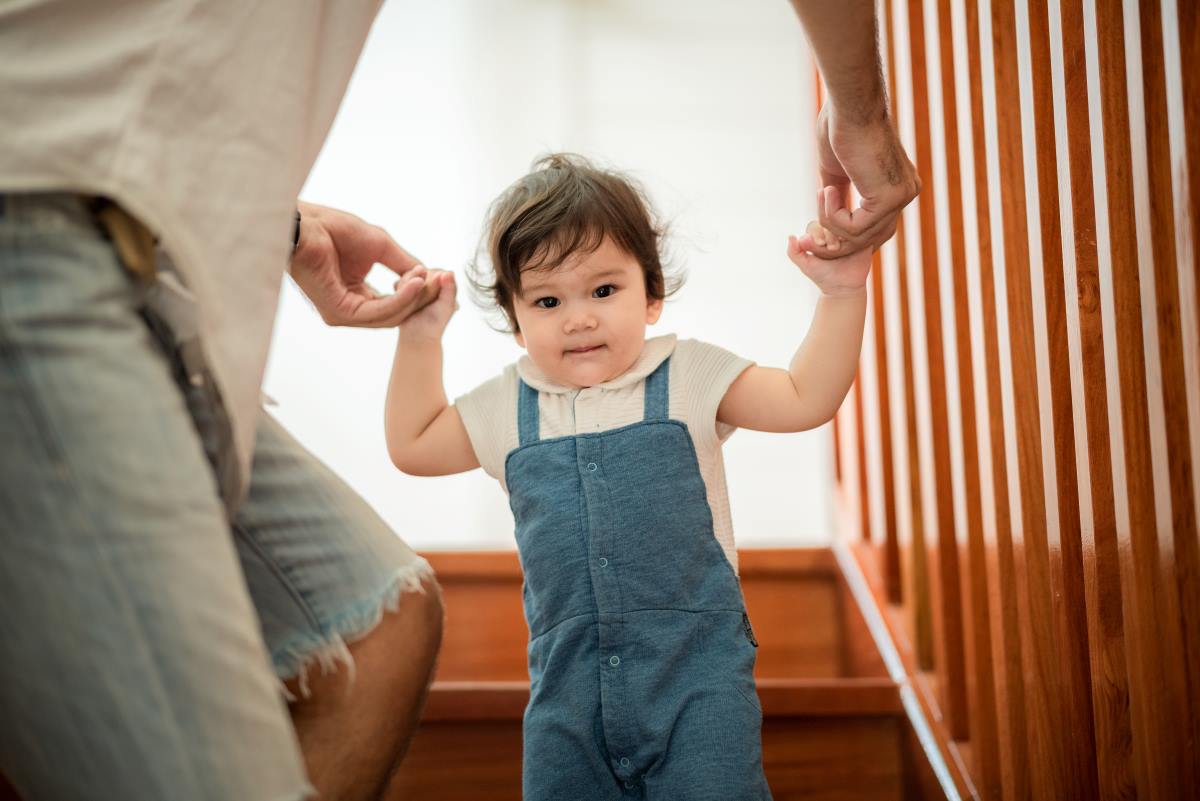
Movement milestones for a 9 month old:
- Pulling Up: Many babies can pull themselves up while holding furniture to a standing position.
- Cruising: They often begin "cruising," meaning walking while holding onto furniture or other support.
- Standing with Support: A baby can stand alone for a few seconds, which is rare at this age.
- Walking: They will walk while holding your hand or with the help of a push toy. Help them stand first.
Most babies stand before walking independently and walk without support for the first time between 9 and 15 months of age, and each child's development differs.
2. Visual and Hearing Milestones for a 9 Month Old Baby
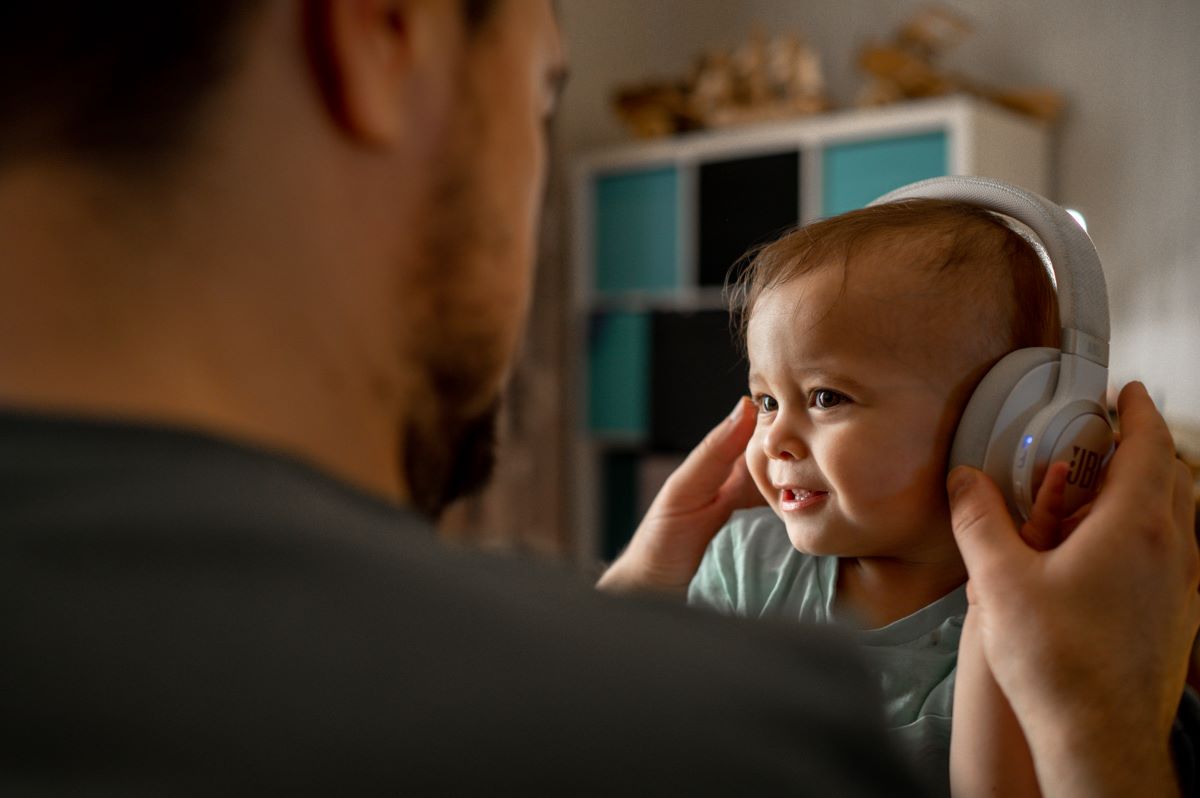
Visual Milestones:
By nine months, their vision allows them to explore and engage more effectively with their surroundings:
- The baby can clearly see distances and will improve in reaching out to grab an object.
- They clearly distinguish colours; colour vision is still coming together.
- They can focus on, examine, and examine small details or objects nearby.
Hearing Milestones:
At nine months, babies can respond to their name and familiar sounds and will also:
- They will twist their head or smile while their name or any other everyday words are pronounced.
- They use a head or body tilt to locate the source of a sound.
- They respond to all tones and pitches but are interested in different voices and sounds.
- They occasionally respond to known sounds or seem to be waiting for them; perhaps they are listening for the creaking of a bottle being opened or the ring of a doorbell.
- These milestones enable babies to interact better with their surroundings and caregivers.
3. Smell and Touch Milestones for a 9 Month Old Baby
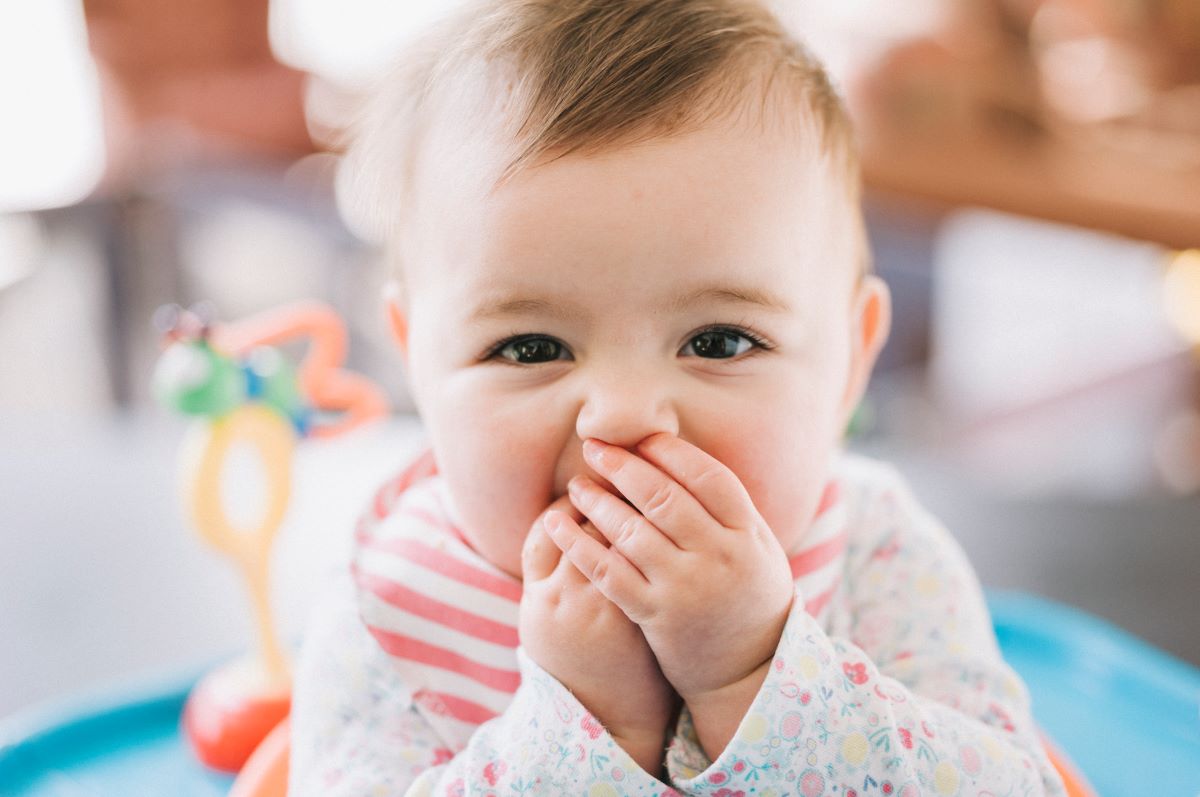
Smell Milestones:
By 9 months, a child can achieve the following smell milestones:
- Detection of Smell: Children learn to identify familiar smells, such as those of a parent or their favourite meal.
- Testing Smell: They can stretch out to check different smells by smelling or reaching towards pungent or exciting smells.
Touch Milestones:
By nine months, a child can achieve the following touch milestones:
- Sensitivity: Babies are susceptible to diverse feelings and respond dramatically towards diverse surfaces such as soft fabric or even more robust sensations.
- Searching and Exploration: They would use their hands to search out an object, being quite explorative in touching something, grabbing, poking and tapping.
- Master of Fine Motor Skills: They can effectively manipulate small toys, distinguishing and providing tactile senses.
- Thermosensitivity: They respond to their environment through touch, as they can feel hot or cold.
These marks can slightly differ from infant to infant, but primarily, most of them represent the developmental milestones of a 9 month old regarding sensory and motor development.
4. Sleep Milestones for a 9 Month Old Baby
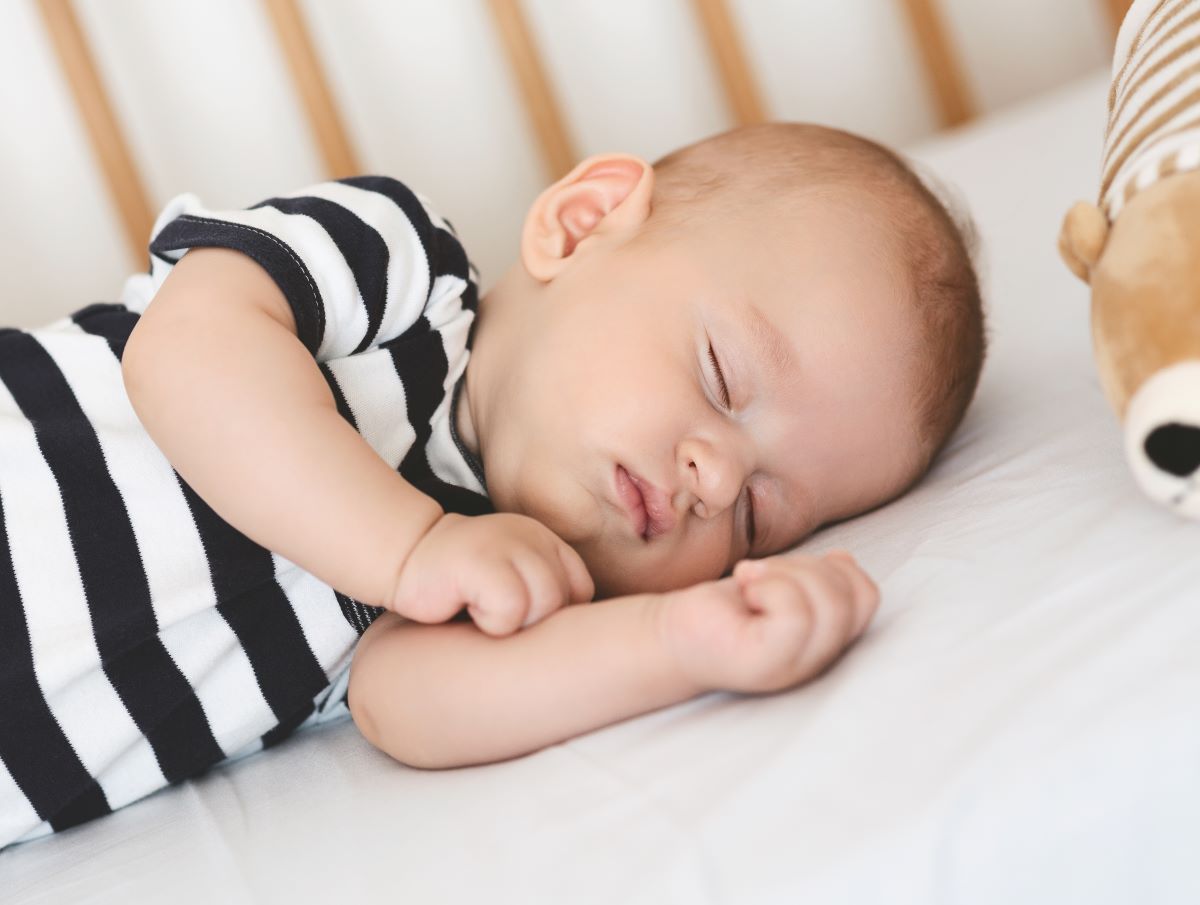
Sleep Milestones for a 9 month old:
- Long Nighttime Sleep: Many babies sleep more contiguous stretches with fewer wakings at night and sometimes sleep 10-12 hours in a row.
- Consistency in Sleep Schedule: The sleep schedule is more predictable, with bedtime and wake times occurring roughly at the same time each day.
- Composite Naps: Most babies at the age of 9 months have been experiencing two naps in a day, one in the morning and in the afternoon, which last about 1 to 2 hours.
- Reduction of Night Feeds: Some babies drop their night feeds and thus can sleep the entire night without waking up for the feeds.
- Self-soothing: Some babies can learn to self-soothe by rubbing their eyes or finding their thumb, thus aiding them in falling asleep without external aids.
Remember also that every baby's sleep pattern will be slightly different, and some will still require additional support or have other sleep needs.
5. Health Milestones for a 9 Month Old Baby
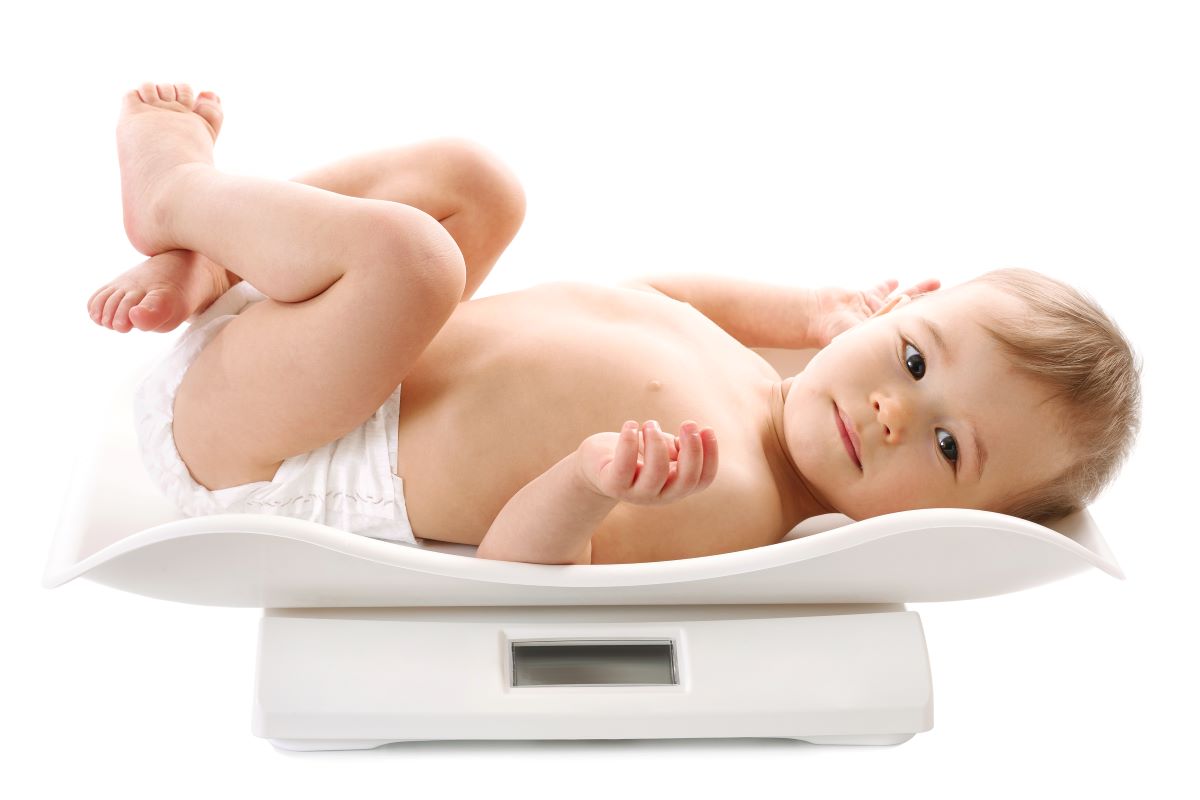
Here are some key health milestones:
These values represent typical ranges, but individual variations can occur. Regular check-ups with a paediatrician will help ensure your baby is on track with their growth and health.
6. Schedule and Routine Milestones for a 9 Month Old Baby
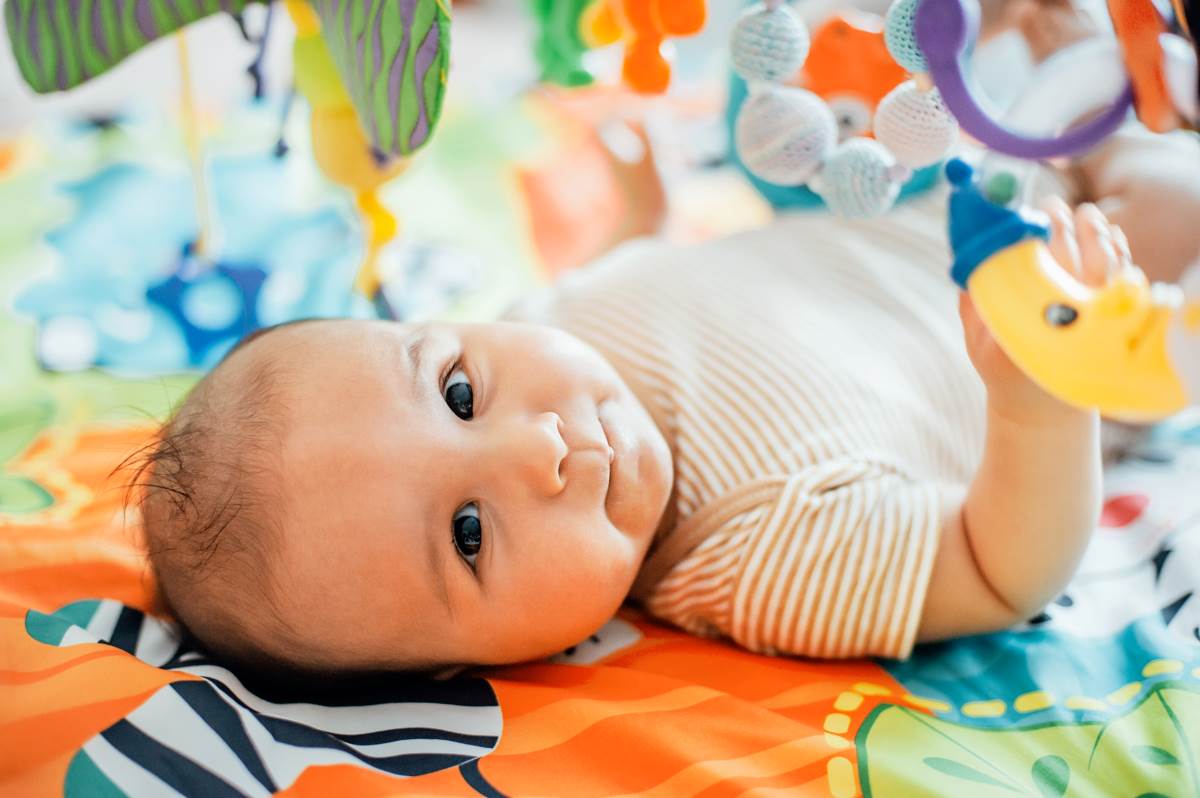
7. Cognitive Milestones for a 9 Month Old Baby
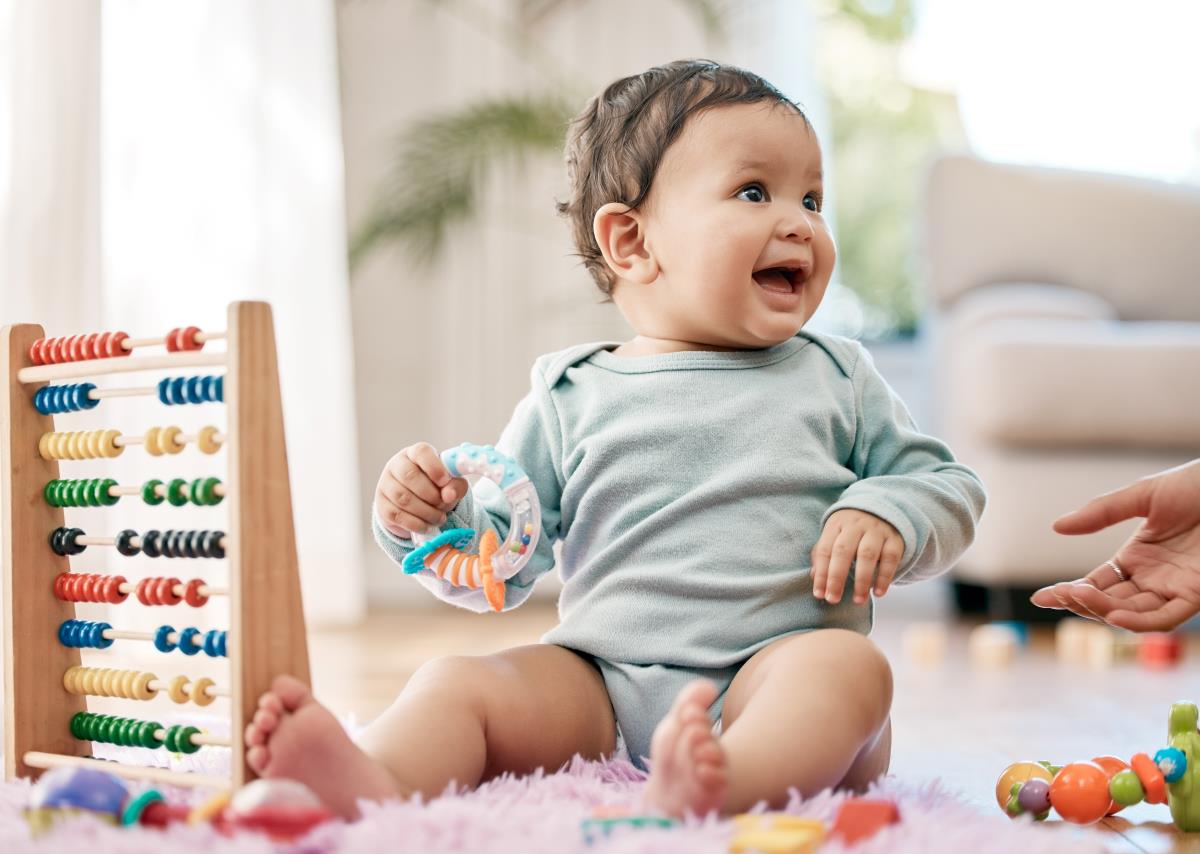
Here are key cognitive milestones for a 9 month old:
- Object Permanence: They realise that objects can be present even if they are out of sight, such as when finding where the toy is under the blanket.
- Exploratory Play of Cause and Effect: They will experiment with actions and what happens as a consequence of those actions.
- Expansion of Memories: They remember rituals or shared experiences, like taking pleasure in the activity of bottle preparation or identifying a favourite toy.
- Simple Problems Solved: They begin solving simple problems. They discover how to get a toy beyond their reach by moving other things out of the way.
- Heightened Sensitivity: Now, they show the most interest in discovering their surroundings, frolicking with objects, and trying to understand how things work.
8. Physical Development Milestones for a 9 Month Old Baby
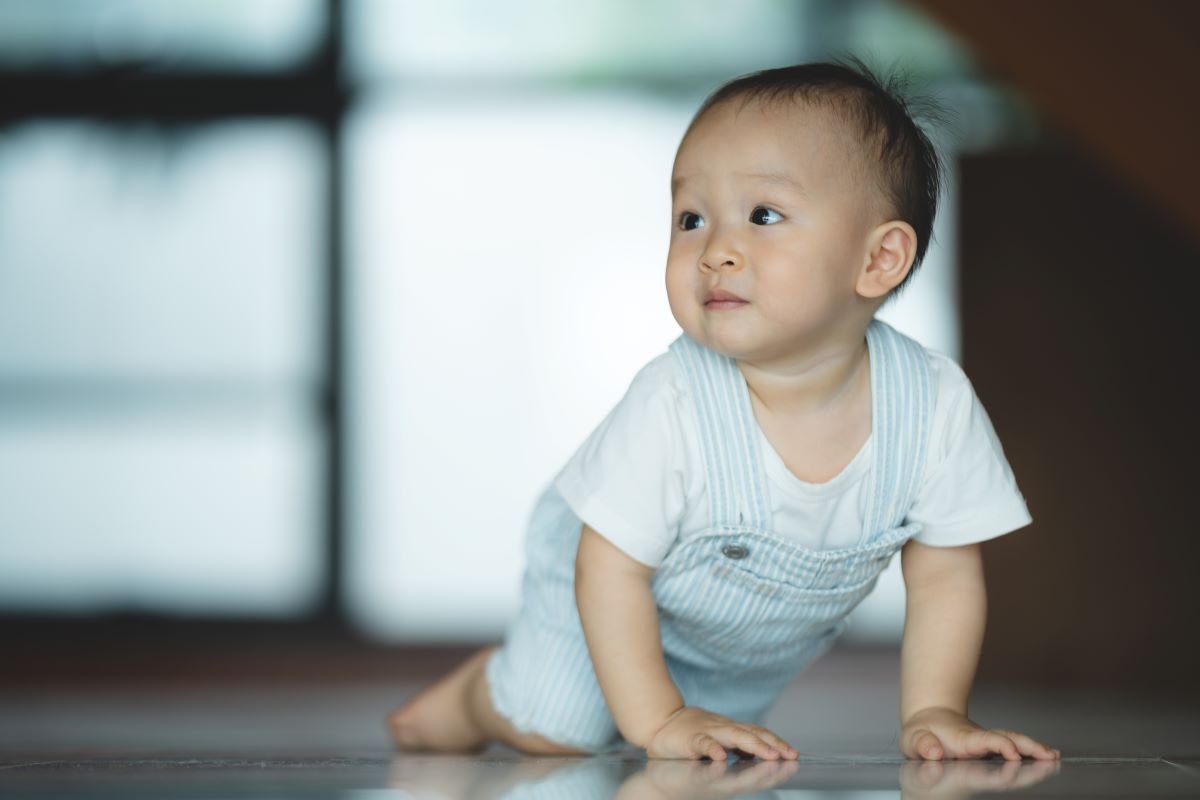
Physical Development Milestones for a 9 month old:
Outstanding achievements in movement and physical activity usually happen by this age, nine months. In general, this is a list of general accomplishments to look for at this age:
- Sitting Up: They can sit independently and balance for extended periods.
- Crawling: Most babies begin moving by crawling and pushing themselves forward.
- Pulling up to Stand: They can move themselves standing on the furniture.
- Cruising: Moves around, holding onto furniture or other objects to support.
- Reaching and Grasping: The child uses the fingers to grasp small objects.
- Rolling Over: It rolls over easily in either direction, from front to back and vice versa.
- Bouncing: Bounces if they are supported erect by an adult.
- Transfers Object: Transfers the object from one hand to another.
9. Social and Emotional Milestones for a 9 Month Old Baby
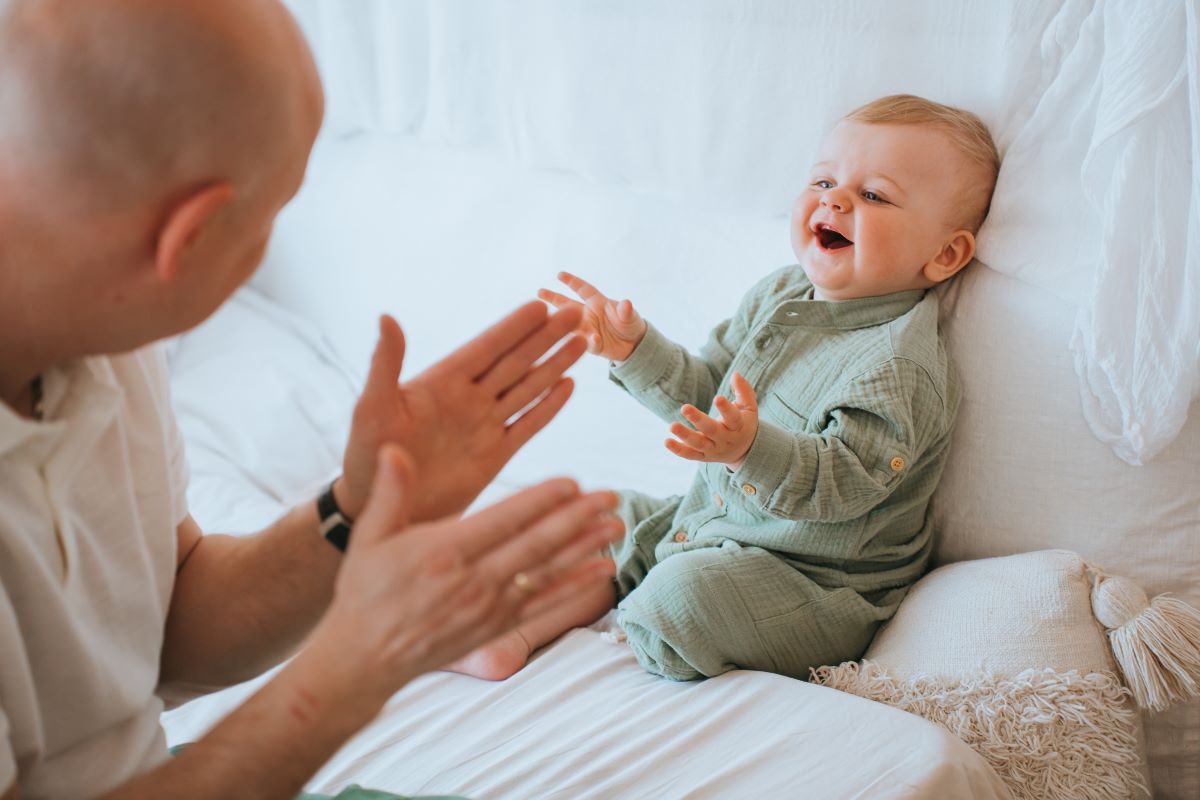
Here are key social milestones for a 9 month old:
- Social Interaction: Enjoys playing with familiar people and prefers the caregivers.
- Stranger Awareness: Gets cautious or shy with someone they do not know.
- Attachment: Attachments occur to primary caregivers and search for comfort.
- Playfulness: Play simple games like peek-a-boo and respond with laughter.
- Imitation: Imitates simple actions or other people's sounds.
- Separation Anxiety: Separated from primary caregivers, but not permanently.
- Expressive Emotion: Smiles or laughs, shows displeasure and interest.
10. Speech Milestone for a 9 Month Old Baby
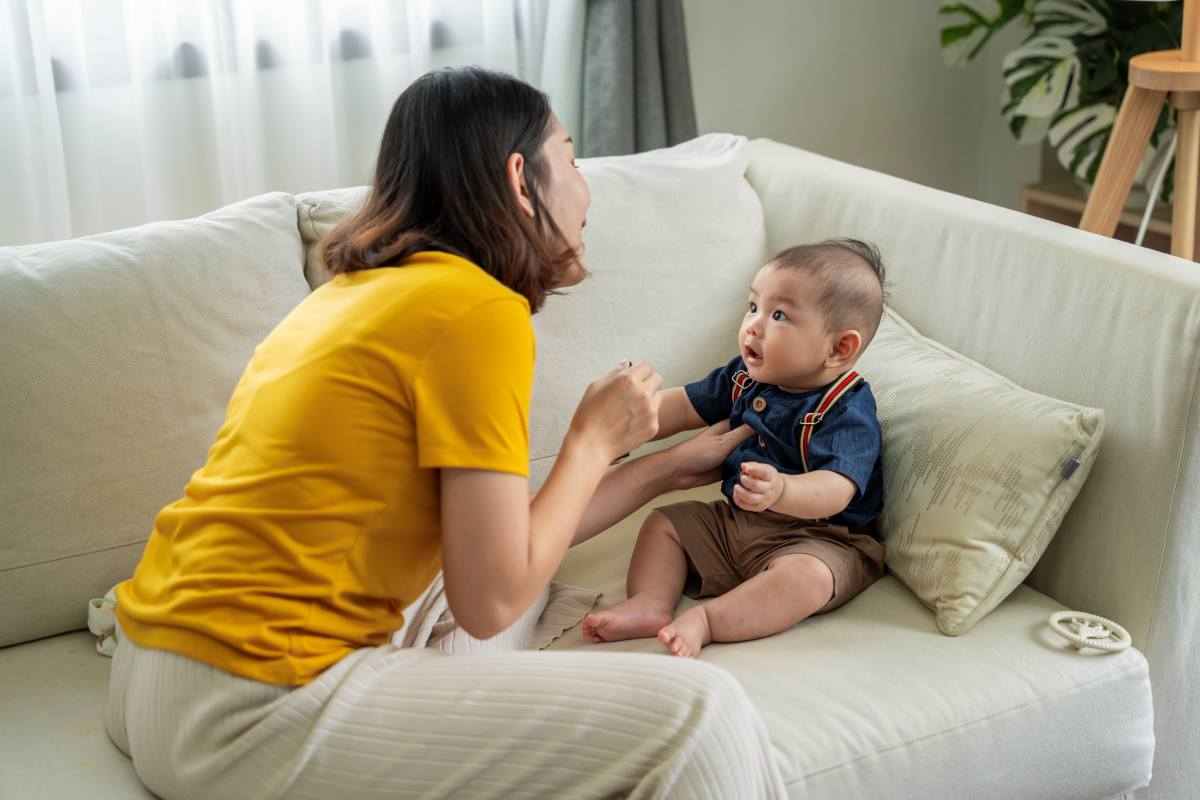
Speech Milestones for a 9 month old:
- Babbling: Babies can produce various sounds and syllables, such as "ba-ba" or "da-da," but they do not yet connect these sounds with any meanings.
- Imitation of Sounds: Babies imitate the sounds and speech patterns they hear, such as those from adults, and then start trying to reproduce similar vocalisations.
- Vocabulary of Common Words: They would associate common words or phrases like "no" or "bye-bye" and react by adopting a different facial expression or behaviour.
- Communication of Desires and Emotions: They use vocalisations and gestures to communicate their desires, emotions, or reactions, such as crying for food.
- Gestures: They use gestures like pointing or waving to express their will or want. These gestures also indicate emotions.
11. Play Milestones For a 9 Month Old Baby
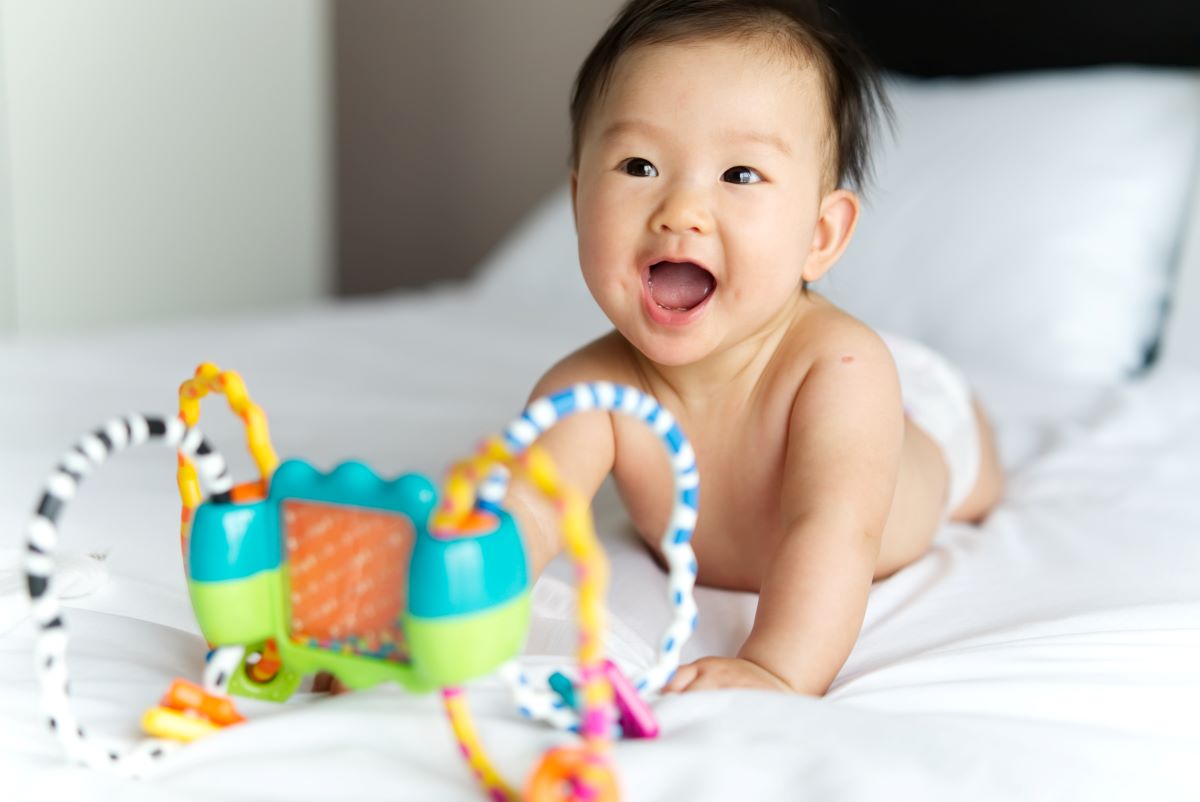
Play Milestones for a 9 month old:
- Gross Motor Skills: Many babies can now sit up, creep, and drag themselves onto hands and knees.
- Fine Motor Skills: They often play with small objects, pinching them between the thumb and index finger to improve hand-eye coordination.
- Social and Emotional Development: One exhibits shyness to strangers or clings to the parent. They love playing peek-a-boo games, among other interactive games.
- Language Development: The baby babbles incessantly using many different sounds, imitates simple words or sounds, and may even acknowledge his name.
- Cognitive Development: They can understand object permanence by wondering where something is or efficiently solving simple problems.
Each baby's milestones may differ, and development may vary from child to child.
What are the Developmental Activities for a 9 Month Old?

1. Tummy Time Games
Toys can be kept out of their reach to encourage crawling while strengthening neck muscles and the upper body. This is the foundation for motor skills like sitting and walking. Keep a toy at arm's length and ensure they reach it.2. Interactive Books
Read colourful, textured, or lift-the-flap books stimulating sensory exploration and language development. The baby will be thrilled with the interactive elements of the book and learn how words connect to things.3. Stacking Toys
Use blocks or cups for stacking to aid fine motor skills and hand-eye coordination. When your baby learns to stack and unstack, they will begin to have problem-solving skills and spatially perceive things.4. Music and Dance
Play various types of music and gently move or dance with your baby to help the infant develop rhythm and coordination. Dancing together also closes the gap between parents and babies by imparting joy to the learning process.5. Play with Safe Objects
Provide your baby with plastic containers and wooden spoons to experiment with while under your supervision. This helps stimulate sensory and motor skills, fulfils one's curiosity, and lets one learn about different textures and sounds.6. Sensory Bins
Pack sensory bins using safe and varied materials, such as rice or water, to explore her hands-on. Cognitive development often falls in this category, but it can also be helpful to learn cause and effect.7. Peek-a-Boo
Encourage your baby to play peek-a-boo games to teach them object permanence and playful play. It's one of the most classic games. With this game, they will understand that objects exist even though they are out of their sight.8. Crawling Obstacles
Set up a small pillow and soft toys-filled course for babies to encourage them to crawl through to solve problems, gain confidence in moving around, and develop physical motion while ensuring safety.9. Play Mats with Interactivity
Give your baby colourful play mats with different textures. Attached toys allow your baby to experience sensory exploration during tummy time, and these play mats allow your baby to discover new sensations safely.10. Finger Painting
Introduce your baby to non-toxic finger paints as a fun, interactive, and sensory activity. Your baby will experiment with colours and textures. Messy play, like finger painting, develops creativity and improves fine motor skills.11. Large Easy-to-Handle Puzzles
Doing a large-sized puzzle together can be very useful in achieving the above factors. It can also nurture your baby's cognitive faculties and hand-eye coordination skills. Help them solve the puzzle while encouraging them.12. Water Play
You can let your baby play with water in a shallow basin or bathtub under your supervision. This activity also activates your baby's perceptual senses and motor skills. Do not keep them in the water for too long.13. Building Blocks
Provide soft, light blocks for stacking and knocking down to help your baby develop spatial awareness and fine motor skills. Building and demolishing towers will challenge your baby's problem-solving and hand-eye coordination capabilities.14. Push and Pull Toys
Pushing or pulling the toy encourages your baby to walk or crawl alone. It helps strengthen his body's muscles, helping him balance, maintain equilibrium, and gain confidence in moving around.15. Explore Nature
Outside environments, such as the backyard or park, allow your baby to touch and explore grass and leaves safely. Exploring nature offers your baby sensory stimulation and also gives your baby a chance to learn about the natural world.Safety Tips For a 9 Month Old Baby
A 9 month old baby requires great caution today to keep it safe. The more mobile and inquisitive the baby grows, the more hazardous the world becomes for its parents:
These safety tips can help instil security into the environment that supports your baby's exploration and development.
How to Support a Baby's Development at 9 Months?
Enrich Play And Support:
Provide toys with crawling, grasping, or other manipulation games like soft blocks or stacking rings. Play with your baby and encourage him to reach for and engage with the other toys.Read Books:
Read to your baby daily, even if it is only for a few minutes. Use simple text with colourful pictures and let the baby explore pages with their hands.Promote Communication:
Talk to your baby regularly. Maintain clear, straightforward communication. Respond to their babbling sounds and attempts to make sounds to develop early language skills.Make a Safe Place:
Ensure the play space is free from hazards like small objects or sharp edges. Baby-proofing the environment will encourage safe exploration and mobility.Support Motor Skills:
To stimulate crawling and reaching, put toys just beyond reach. Provide sturdy furniture or toys that children can hold onto so they can pull up to a stand.When to Talk to the Paediatrician?
1. Delayed Milestones
Your baby is significantly behind every other child in developmental milestones, such as crawling, walking, or speaking.2. Persistent Health Issues
Your baby has recurring problems related to infections, chronic coughs, or digestive issues.3. Unusual Behaviour
If the newborn shows unusual behaviour, like the baby cries too much, appearing lethargic, or has an abrupt change in sleep patterns.4. Growth Concerns
If the weight or height of the baby does not correspond to the growth charts or if the baby begins changing its pattern abruptly.5. Developmental Issues
When you are concerned about your baby's motor skills, social interactions, or language development.6. Skin Issues
If your baby persists with rashes, unusual skin changes, or severe eczema/allergy issues.7. Weight Issues
If they appear to be failing to gain weight as fast as expected or if you are concerned about their consumption of nutrients.8. Dentition
If the baby's teeth are over time, if the baby's oral health is being compromised.9. Behavioural Changes
When your baby undergoes a significant behavioural or mood change that may be linked to more critical issues.FAQs about 9 Month Developmental Milestone
What are three major physical milestones by nine months of age?
What is the understanding capacity of a 9 month old?
What are the critical developmental achievements of a 9 month old baby?
What are the most common signals when my nine month baby is prepared to stand or walk?
What to feed my 9 month old?
How many hours of sleep does a baby need at nine months?
How common is it for a 9 month old to have separation anxiety?
What are some developmental signs of language growth at nine months?
How can I support my 9 month old baby's cognitive development?
What do 9 month old babies think about?
What are the communication milestones for a 9 month old?
What do you feed a 9 month old baby milestones?
What is the normal behavior of a 9 month old baby?
Does a 9 month old need solids every day?
How much should a 9 month old weigh?
Important Articles about Infant Developmental Milestones
Disclaimer
- This is an informative article provided on 'as is' basis for awareness purpose only and not intended as a professional advice. The content of the article is derived from various open sources across the Internet. Digit Life Insurance is not promoting or recommending any aspect in the article or its correctness. Please verify the information and your requirement before taking any decisions.
- All the figures reflected in the article are for illustrative purposes. The premium for Coverage that one buys depends on various factors including customer requirements, eligibility, age, demography, insurance provider, product, coverage amount, term and other factors
- Tax Benefits, if applicable depend on the Tax Regime opted by the individual and the applicable tax provision. Please consult your Tax consultant before making any decision.
Latest News
Read More
















